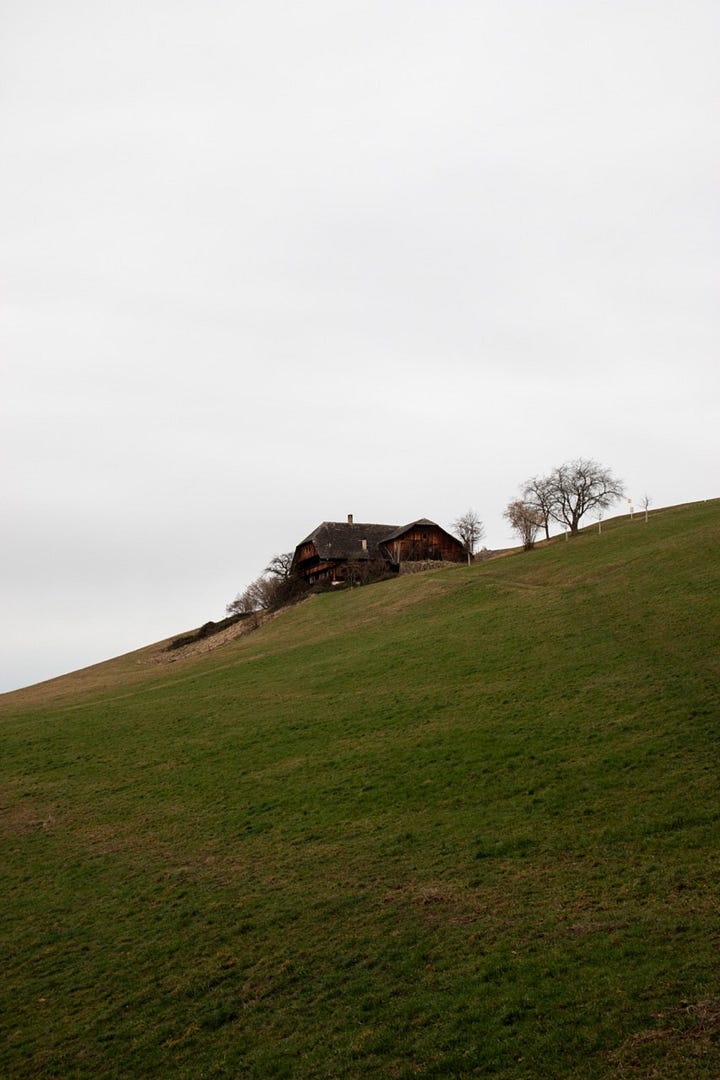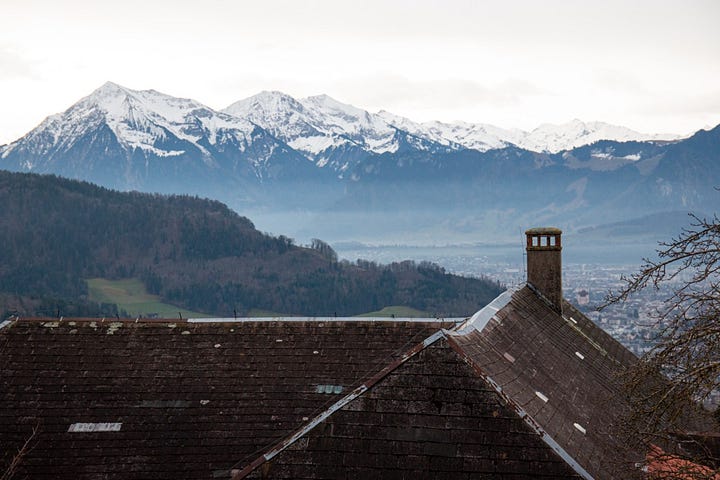Welcome to the pages of my Travel Journal, featuring meandering portrayals of life on the road. This one comes to you from the Swiss Alps. For quicker reading, you might prefer my series of Sketches.
“Where have you come from?” said the unsmiling Swiss border guard, eyeing my car and the box on its roof.
“The UK.”
“Where in the UK?”
“Scotland.”
“Where in Scotland?”
Er… did he want to know exactly? As a lone male I was probably a prime target for his scrutiny, although I thought my floppy canine passenger might have made me an unlikely smuggler of contraband. Fortunately he waved me through, still doing his best to look unconvinced.
If anything, I was more apprehensive about the next guard whose job it was to sell me a vignette (the sticker that shows you've paid to drive on Swiss motorways). At a car show in England a few years ago, I remember a classic Range Rover whose windscreen, down its left-hand side, displayed an immaculate column of Swiss vignettes. There was one for each year covering about a decade and all were perfectly aligned. It was silly, but I rather envied it, partly because the only vignette I had ever received – on my old Fiat Panda back in 2009 – was decidedly on the wonk.
It’s not quite like passport stamps, you see. With those, you want a bit of wonk. Something that suggests a hurried thump from the fist of a busy customs officer, queues of flustered families laden with luggage and a dozen languages filling the air. But a Swiss vignette, like a watch or an army knife (or most other Swiss clichés) ought to evoke some sort of precision. No chance of that for me. Now both times it's been my turn to cough up and receiver a sticker, it's been a wonky one. Inevitable really, because if you're driving a UK car and you don't have a passenger, the person dishing out the vignettes from the left-hand window tends to reach in and splodge it on for you, paying only enough attention to make sure it’s upright. I can hardly blame them.
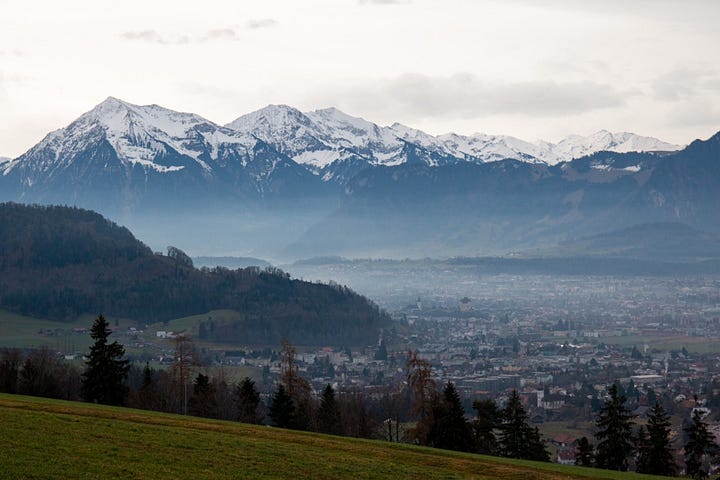
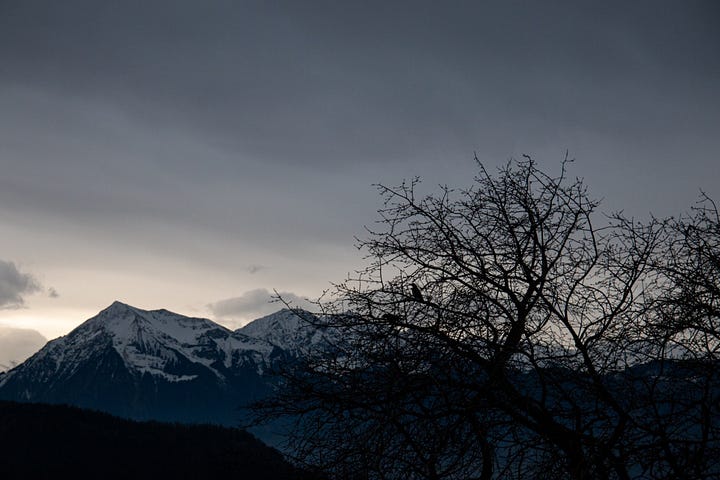
In the hills above Thun, I arrived at a large wooden farm house whose proprietor, Fritz, lets out a newly-refurbished section of it on AirBnB. Like most of the buildings in the village, it was large and old and wooden and deeply picturesque. A smart blue tractor poked out of an adjacent barn (also made solely from dark old timbers) and crystal-clear water tricked from a tap into a mossy stone trough in the yard. Southwards beyond the distant town in the valley below, a wall of mountains was slowly disappearing into gentle white clouds, though their jagged black-and-white peaks still identified the skyline as being unmistakeably Alpine.
Exactly which bit of the farm was being let was a mystery, and the couple who arrived slightly ahead of me were as baffled as I was. We dithered in polite circles until an older woman appeared, whom we presumed had some connection to Fritz. Neither welcoming nor frosty, she spoke German with a tone which seemed to say, “So, you want to stay here in our village do you? Well, that might be alright. You talk funny but you don’t look like trouble.”
I like this Germanic brand of old-school conservative hospitality. There’s always a heartfelt welcome for the respectful traveller, but you have to show your cards first. She reminded me of a woman I had met on the ferry down Lake Lucerne on my first visit to Switzerland, as a teenager on a bike, ages ago. She was broad and stern, but quite jolly, and insisted I return to Switzerland again “mitt your fraynds” to stay with her family. One of the first things English people need to learn when travelling abroad is that the absence of a smile between strangers does not imply hostility. A bit of a generalisation – not all Brits are pathetically compulsive smilers like myself – but I think it holds true.
Despite making attempts in both French and German, the couple seemed to be getting no useful information out of the advance guard, but Fritz, we learned, could be found in the fields. Appealing as these fields were – steep grass all around that led right up to the edge of the roads with no ditches or barriers to prevent you from twirling happily through them singing “the hills are alive” etc. – I didn’t fancy trekking aimlessly around them in what was left of the daylight. Fortunately, Fritz soon appeared, spoke some German which I struggled to understand, pointed in the direction of the room, and indicated “Whatsapp” – the desired medium for further communication. There, with the aid of Google Translate, he was as thoughtful and attentive as a host can be.
Before settling in, Alfie and I went to explore the village and took a path through a mixed wood of conifers and beech, where a little encirclement of benches had been established around a brick barbecue. A stash of firewood to fuel it was piled nearby, along with a summerhouse, a rustic row of coat pegs, and some sort of workbench no higher than my knees, equipped with a little vice. As a workstation it seemed inexplicable, but as a place to spend a wholesome evening with friends around the flames, it couldn’t be beaten. Alfie liked the place too, and rolled manically in the leaves.
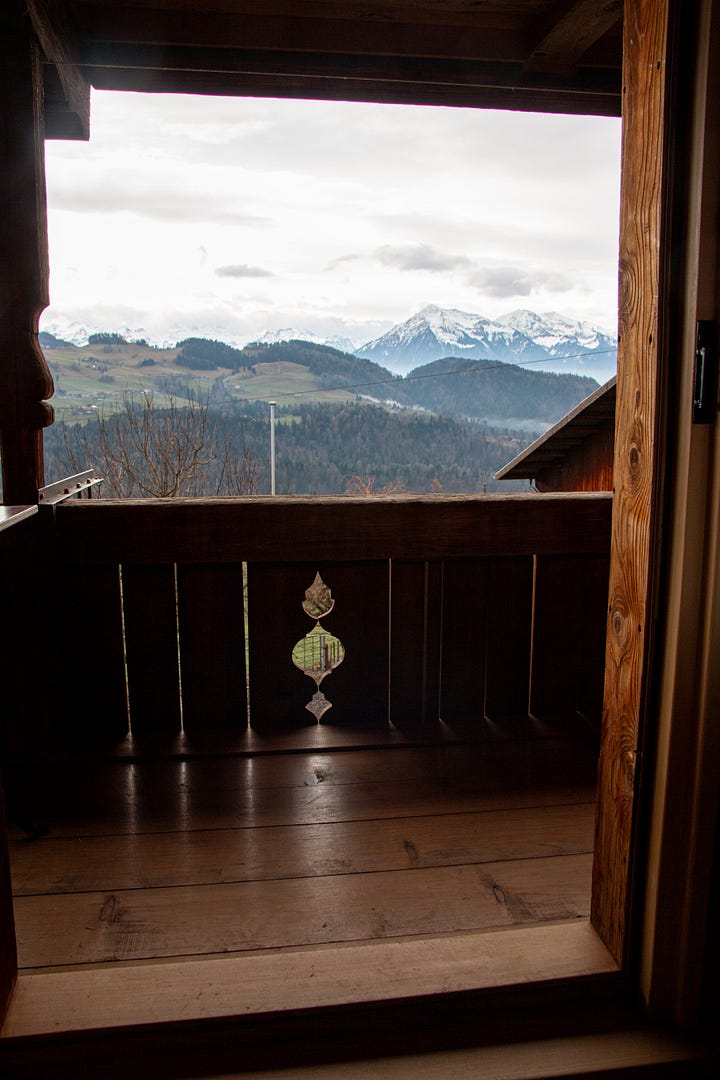
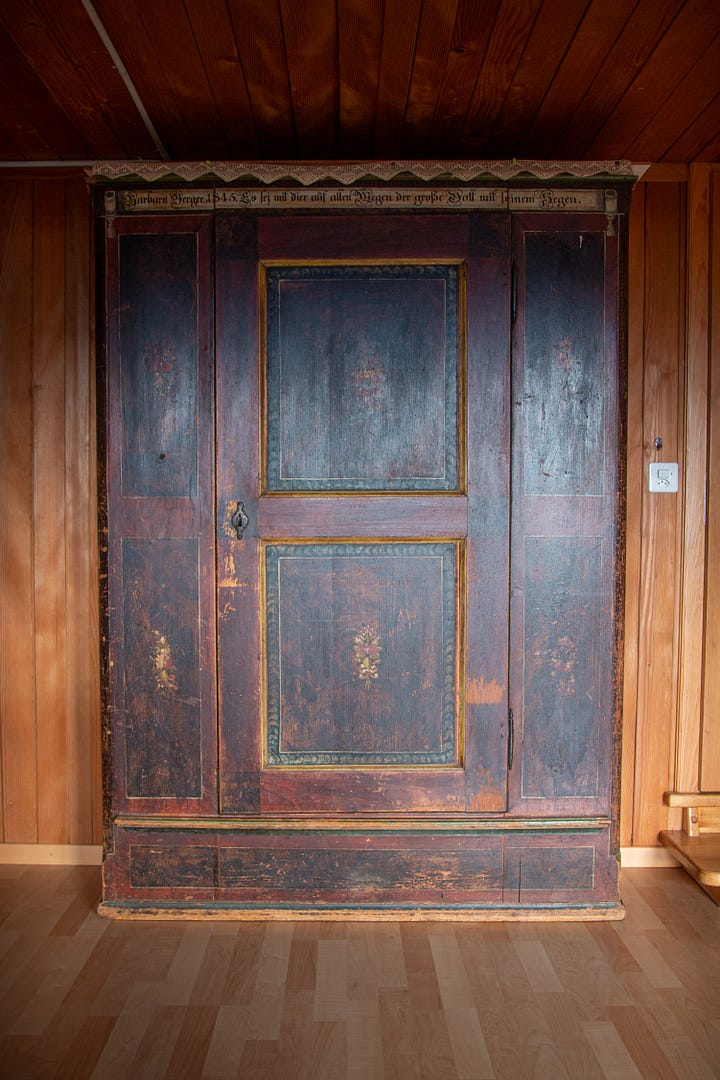
My room was modern, apart from one of the most beautiful wardrobes I have ever seen. Like old portraits in museums, its hand-painted decorations had become muted with the passing of decades, but a painted scroll along the top clearly dated it to 1845, and bore the name Barbara Berger – the same surname as Fritz. I felt genuinely honoured to share a room with it. If only more old furniture could reveal its family origins so clearly; perhaps then we would appreciate it more, and be less keen to offload it at the nearest auction house (or worse) and make the pilgrimage to Ikea for its crappy replacement.
The air in the village had a peaceful stillness that can be hard to find in the UK, and a church bell nearby gave a homely toll. Stepping out onto my balcony should have been serenity itself, but Alfie was consumed with a rampant desire to make merry with the farm’s gaggle of proprietorial-looking cats. I therefore arrived in my room with an aching left knee, having collided with the steps which led up to it as Alfie yanked me skywards. What he intended to do with these cats I don't think even he knew, but whatever it was, unless I maintained a tight grip on his lead, it was certain to end bloodily. Sometimes car journeys can put Alfie off his food, but the confrontation with his feline foe had reminded him that he is a dog and dogs are supposed to be hungry. Or perhaps he was fuelling himself for battle. He certainly attacked his dinner with more gusto than usual.
For me, dinner was sweaty cheese and dollops of a pork ‘terrine de campagne à l'ancienne’ that I had bought in France, and as I spooned it onto some crispy bread I couldn't help noticing its resemblance to the hideously expensive tins of flesh that Alfie's delicate complexion requires.
When one of the cats – a cute little thing but a guaranteed harbinger of mayhem – appeared on the window ledge and decided to remain there, eyeballing Alfie suspiciously from behind the glass, I decided it was time to close the curtain.
